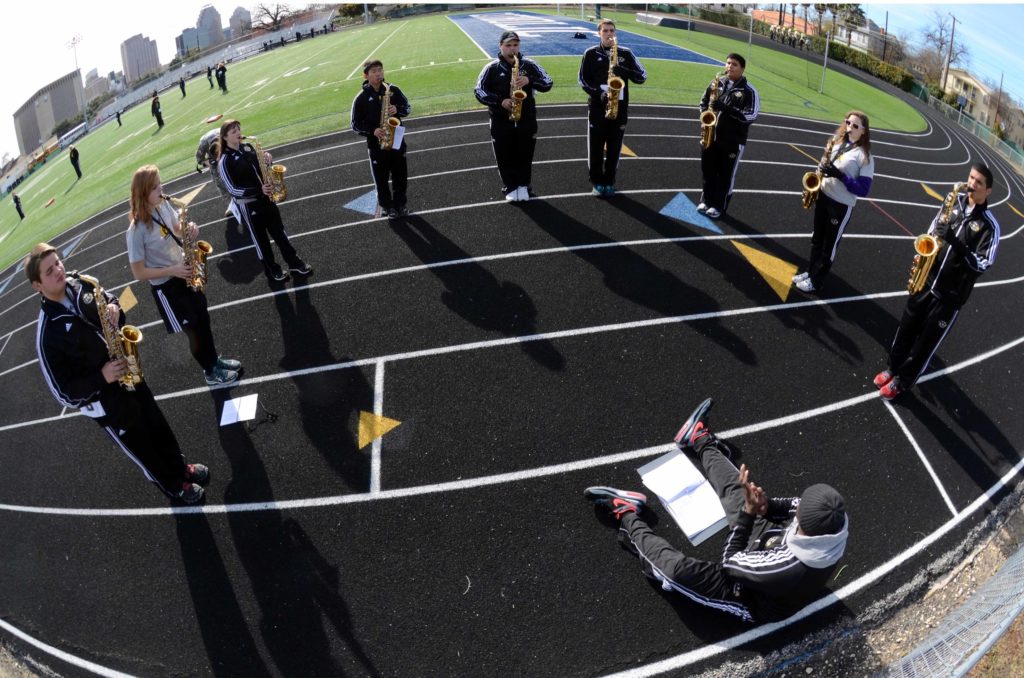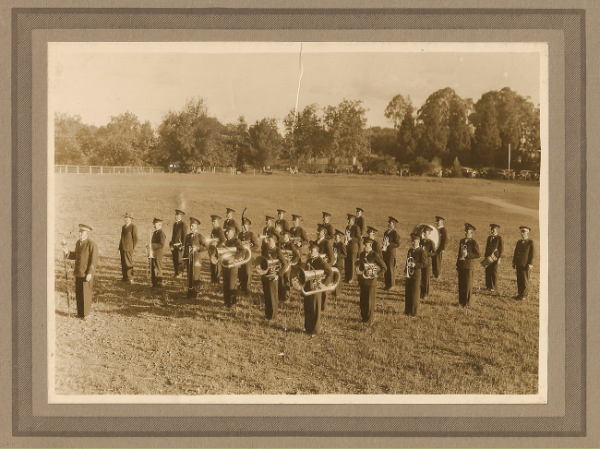
Used under Creative Commons License
Originally published March 25, 2011 on Sound Education Blog.
Performing, listening to, and enjoying great music are their own rewards. But most people recognize that there are many additional life lessons learned while studying music. We discussed these lessons in a 2010 #MusEdChat collaborative session on Twitter. This series of blog posts contains my reflections on that discourse. Thank you to those who participated in the conversation.
Music Life Lesson #9: Leadership
How is leadership learned, practiced, or experienced as a member of a high school band? Leadership is demonstrated by the director, the students, and the band as a whole. Through the study of music, students learn leadership and take on the qualities of a leader. In addition to improving the experience of band, strong leadership will also give these students an advantage in their studies, college applications, and professional life.
All forms of leadership being conducted within a band are derived in one way or another from the director. This is the individual with the greater life experience, the one who has been with the group the longest, and who’s personal mission is the success of the ensemble. The director inherently stands at the top of the leadership pyramid. His or her philosophy, attitude, work ethic, and personal dedication is reflected directly in the band.
When a student first walks into the band room, training in leadership is underway. The older students (and the director) are modeling behavior through their own actions. This is indirect leadership. This is possibly the most important and powerful form of leadership. We are defined by our actions, rather than our thoughts or even words. And young, nervous 14 year olds walking into a room of well disciplined, well behaved, and kind older students will do all they can to fit in to the mold that has already been set.
Many bands have specific leadership positions for students. The most prominent is Drum Major, but other common ones are president, vice president, treasurer, secretary, librarian, uniform manager, and section leaders. Each of these affords the young musician an opportunity to practice his or her leadership skills and be held accountable for the office. Through the years, I’ve handled these sorts of positions in different ways.
My drum major is selected through a tryout/interview process among eligible candidates. This is the most visible student leader who, more than any other stands in the place of the director in rehearsal and in public. Care must be taken to select a student who is already a leader, who shares a common vision for the program with the director, and who has the respect of the ensemble. The drum major audition really begins (once more) that first day that they enter the band room as a freshman. The director is in constant observance of all students and those with strong leadership traits set themselves apart quickly. Natural leaders do not wait for direction, but do what needs done. They serve others in ways that are not self-serving. Their heart is with the success of each individual student and the group.
“The real leader has no need to lead – he is content to point the way.”
-Henry Miller
I have gotten away from having the traditional “band council” positions in favor of a Student Leadership Team. This is made up of all 11th and 12th graders who have been in the band for at least two years. I do not see this as “leading by committee” because as the director, I make all executive decisions. Keeping the student leaders at one level empowers each of them to step up in any situation and lead. This allows a greater opportunity for participation in band leadership. It also prevents the possible problem of a “stale band council” who may flounder in inactivity shortly after being formed. With the exception perhaps of librarian or uniform manager, there are not really any other necessary positions requiring specialized skills that could not be performed by any student within the Leadership Team. This also reinforces my belief that every member of the band must be acting as a leader at all times. Leadership is not about telling or titles, it’s about doing. Someone once shared a great question to pose to a band regarding leadership:
“What would the band be like if everyone did it the way you do?”
I do think that section leaders are important. Section leaders are not necessarily the best players, but they could be. They should at least able to demonstrate good tone, technical facility, posture, etc. on their instrument in order to set a good example. Being a talented player, though, doesn’t mean that you inherently posses any qualities of leadership. The selection of section leaders should be made based on their previously demonstrated leadership from the time they entered the ensemble. This should not be a popularity contest; it should be a service contest. Section leaders are responsible for the rehearsal of their groups in sectionals. They should also be responsible for making sure every member of their section is prepared musically, knows call times, has fundraising turned in, etc.
Another area of leadership that is not often talked about is that of the band as leader. I expect my band to be a leader as a subset of the school and a leader within the community. Again, this is by way of example and professionalism. The band should be thought of with respect by those with which it interacts. This is because top to bottom, we act in accordance with our mission and vision, have the best interest of the ensemble at heart, and act as we would hope our leaders would act.
Leadership comes so naturally within a musical organization because music itself demonstrates leadership. We follow the score written by the composer. The audience is led emotionally by the band. There is a proper blend of individuals within the ensemble to create a successful sound. There is a correct balance structure in the instrumentation that changes based on the situation (think: student leadership tasks). Of course the ensemble follows the directors lead visually. But they must also listen among themselves and self-correct in order for the group to produce the most artistic, harmonious performance.
What About You?
What has been your leadership experience in a music ensemble or elsewhere? How did it affect your time in the ensemble? How did you grow as an individual because of the responsibilities of leadership and the lessons learned? Please share your thoughts in the comments.
This is part 9 of a 12 part series.


